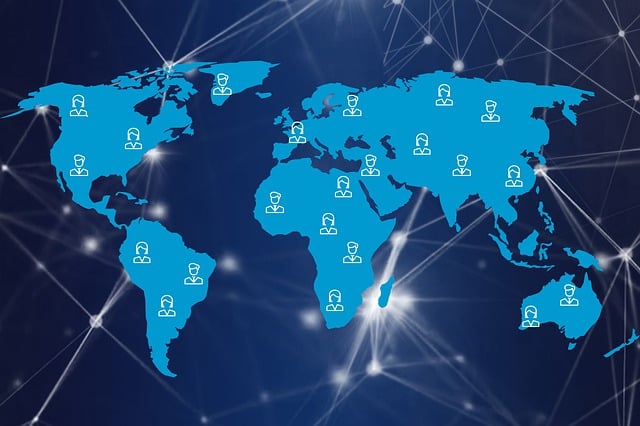AI workflow optimization revolutionizes business operations by automating repetitive tasks, boosting efficiency, and freeing up resources for strategic initiatives. Chatbots handle customer service, data entry, and contract drafting, minimizing human error and enhancing productivity. Real-time data analysis provides insights, while AI algorithms streamline processes, giving businesses a competitive edge in the digital era. This rapid adaptation tool enables quicker market responses, data-driven decisions, improved customer experiences, and cost savings.
In today’s fast-paced business landscape, AI workflow optimization is revolutionizing operations by unlocking unprecedented efficiency. This transformative technology streamlines tasks, automates routine processes, and reduces human error, leading to dramatic increases in productivity. By enhancing decision-making capabilities, AI empowers businesses to adapt swiftly to market changes. From healthcare to finance, industries are experiencing rapid transformations, all driven by the dynamic potential of ai workflow optimization.
- Unlocking Efficiency: AI's Role in Streamlining Tasks
- Automating Routine: Reducing Human Error and Increasing Productivity
- Intelligent Decision Making: Enhancing Business Strategy
- Rapid Adaptation: AI's Ability to Transform Industries Fast
Unlocking Efficiency: AI's Role in Streamlining Tasks

In the realm of business operations, ai workflow optimization acts as a game-changer, unlocking unprecedented levels of efficiency by streamlining tasks that were once time-consuming and error-prone. Artificial intelligence (AI) agents are now capable of automating repetitive processes, from data entry to customer service inquiries. This ai automation revolutionizes the way businesses operate, ensuring accuracy and speed in executing tasks.
By leveraging AI technology, companies can free up valuable resources previously dedicated to mundane, rule-based work. This allows employees to focus on more strategic initiatives that require human creativity and judgment. As a result, ai sales teams experience enhanced productivity, enabling them to connect with customers more effectively and drive business growth.
Automating Routine: Reducing Human Error and Increasing Productivity

AI workflow optimization has a profound impact on automating routine tasks, leading to significant improvements in business efficiency. By leveraging artificial intelligence, companies can reduce the burden of repetitive, time-consuming jobs on their workforce. For instance, AI sales tools and chatbot automation can handle customer inquiries, order processing, and even basic contract drafting, thereby freeing up human agents to focus on more complex, value-added responsibilities.
This shift not only decreases the potential for human error but also dramatically increases productivity levels. Chatbot automation, in particular, ensures consistent, 24/7 availability, allowing businesses to respond swiftly to customer needs without delays or resource allocation constraints. As a result, organizations can streamline their operations, enhance service quality, and gain a competitive edge in today’s fast-paced market.
Intelligent Decision Making: Enhancing Business Strategy

In the realm of ai workflow optimization, intelligent decision-making capabilities significantly enhance business strategy. AI agents can analyze vast amounts of data in real time, providing insights that were previously difficult to attain manually. This enables businesses to make more informed choices, quickly adapt to market changes, and optimize resource allocation for maximum efficiency.
By implementing ai automation through sophisticated algorithms and ai funnel systems, companies streamline processes that were once cumbersome and time-consuming. This not only boosts productivity but also allows employees to focus on higher-value tasks, fostering a more strategic and innovative work environment. As a result, businesses can gain a competitive edge in today’s fast-paced digital era.
Rapid Adaptation: AI's Ability to Transform Industries Fast

In today’s fast-paced business landscape, rapid adaptation is key to staying competitive. Artificial Intelligence (AI) workflow optimization emerges as a powerful tool that enables industries to transform at unprecedented speeds. AI chatbots, for instance, can automate repetitive tasks, drastically reducing turnaround times and increasing efficiency across various sectors. From customer service to data analysis, these intelligent assistants streamline operations, allowing businesses to respond swiftly to market changes and consumer demands.
This ability to quickly adapt is a game-changer, especially in dynamic industries where staying ahead requires constant innovation. AI workflow optimization doesn’t just enhance productivity; it empowers organizations to explore new possibilities, make informed decisions based on real-time insights, and deliver exceptional customer experiences—all while minimizing operational costs.
AI workflow optimization is revolutionizing business processes by unlocking efficiency, automating routine tasks, and enhancing decision-making. This technology enables rapid adaptation across industries, transforming operations swiftly and effectively. By leveraging AI, businesses can achieve unprecedented levels of productivity, accuracy, and agility, ultimately driving growth and maintaining a competitive edge in today’s fast-paced market.
